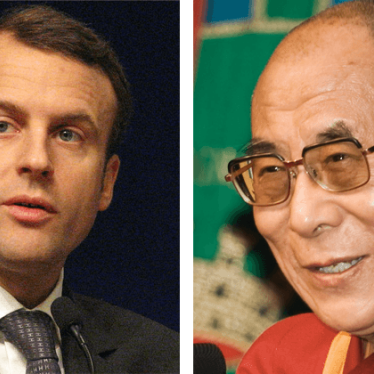(New York) – The Chinese authorities’ baseless prosecution of a Tibetan language rights activist demonstrates the government’s contempt for the rights of minority peoples, Human Rights Watch said today. On May 22, 2018, a court in Yushu prefecture, Qinghai province, sentenced Tashi Wangchuk to 5 years for “inciting separatism.”
Governments, United Nations human rights experts, and international organizations have repeatedly called for Tashi Wangchuk’s release.
“Tashi Wangchuk’s only ‘crime’ was to peacefully call for the right of minority peoples to use their own language—an act protected by China’s constitution and international human rights law,” said Sophie Richardson, China director. “His conviction on bogus separatism charges shows that critics of government policy on minorities have no legal protections.”
Tashi Wangchuk, 31, was detained on January 27, 2016, after appearing in a New York Times video in which he advocated for the rights of Tibetans to learn and study in their mother tongue. Although he told the newspaper explicitly that he was not calling for Tibetan independence, he was charged in March 2016 with “inciting separatism,” an offense that carries up to a 15-year prison sentence. The case was brought to trial at the criminal court in Yushu on January 4, 2018, after a delay caused by the procuracy referring the case back to the police for further investigation in December 2017.
The discontinuation of Tibetan-medium education in public schools in Tibetan areas of Qinghai and Gansu since 2012, and forced closure of Tibetan-medium private schools, caused a surge of popular protest in these areas and has become an issue of prime concern in the Tibetan community. Tashi Wangchuk traveled to Beijing in May 2015 to explore filing a formal complaint against officials in his home area for failing to support Tibetan language education. On that visit, he met with New York Times journalists and “insisted on doing on-the-record interviews,” according to the paper. In September 2015, the Times’ journalists traveled to Yushu to meet him, and in November 2015, the paper published articles about his efforts in English and Chinese, together with a nine-minute video in both languages. Although this initiative violated no Chinese laws, authorities appear to have treated it as unusually sensitive given the involvement of foreign media.
China’s Constitution states that “All nationalities have the freedom to use and develop their own spoken and written languages.”
The prosecution of Tashi Wangchuk violates the International Convention on the Elimination of All Forms of Racial Discrimination, which China ratified in 1981. Under the convention, China is obligated to ensure that ethnic minorities enjoy equal rights, including freedom of expression and “the right to equal participation in cultural activities.” The UN Human Rights Committee has stated in a general comment that “individuals belonging to … minorities should not be denied the right, in community with members of their group, to enjoy their own culture, to practice their religion and speak their language.”
Tashi Wangchuk’s prosecution fell far short of international due process standards. After being detained in January 2016, he was held in secret in a detention center in Yushu while his case was investigated by the police.
Although Chinese law requires that a detainee’s family be informed of a detention within 24 hours, such a requirement can be waived in cases involving “national security” and “terrorism” and when the police believe that such notification could “impede the investigation.” His family was not provided such notice until March 24. At that time, police notified his family that they intended to charge him with “inciting separatism.” He was held for nearly two years before being brought to trial, and during that time had limited access to his family and to lawyers of his choice.
“What’s really on trial, in this case, is China’s credibility in upholding its own laws and respecting peaceful criticism,” Richardson said. “It has failed miserably, but it’s Tashi Wangchuk—and Tibetans who want to study in their own language—who will pay the price.”









